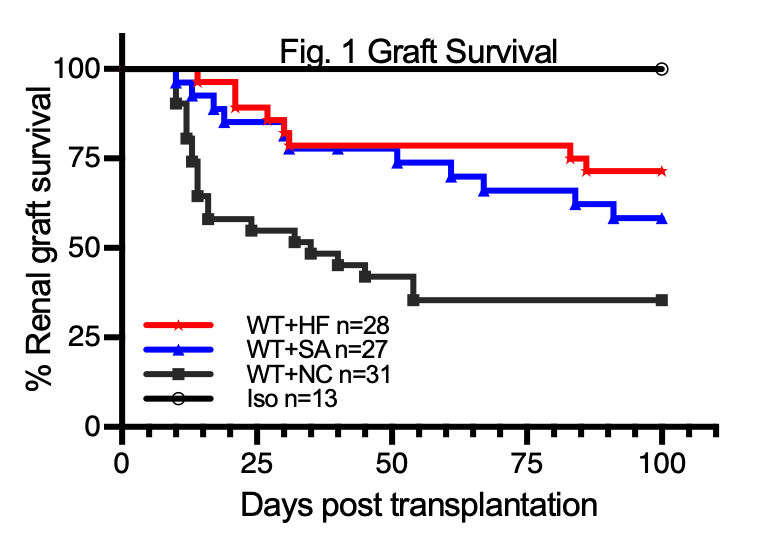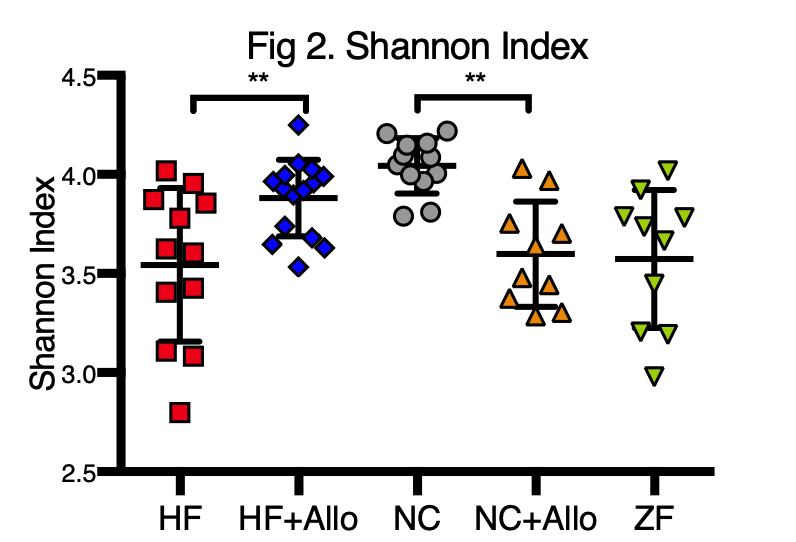High Fibre Diet Prevents Transplant-Associated Dysbiosis and Prevents Kidney Allograft Rejection
1Kidney Node Laboratory, Charles Perkins Centre, The University of Sydney, Sydney, Australia, 2Nutritional Immunometabolism Lab, Charles Perkins Centre, The University of Sydney, Sydney, Australia, 3The Children's Hospital Westmead, Sydney, Australia
Meeting: 2019 American Transplant Congress
Abstract number: 373
Keywords: Graft survival, Kidney transplantation, Rejection, Tolerance
Session Information
Session Name: Concurrent Session: Tolerance / Immune Deviation
Session Type: Concurrent Session
Date: Monday, June 3, 2019
Session Time: 4:30pm-6:00pm
 Presentation Time: 4:42pm-4:54pm
Presentation Time: 4:42pm-4:54pm
Location: Room 310
*Purpose: To investigate the impact of high fibre (HF) diet or dietary supplementation with the short chain fatty acid (SCFA) sodium acetate (SA) on kidney allograft rejection in a murine model of kidney transplantation
*Methods: Kidney transplants were performed from BALB/c to C57BL/6 mice as allografts. Allograft mice were fed a HF diet for 2 weeks prior and throughout experiments (WT+HF), or received SA 200mg/kg IP for 14 days post-transplantation then SA 150mM solution orally (WT+SA; GPR43-/-+SA). Allograft controls received normal chow only (WT+NC). Gut microbiota composition was assessed by 16S rRNA sequencing.
*Results: WT+HF allografts had prolonged survival compared to WT+NC allografts (Fig.1 p<0.01), and were protected from acute (day 14: lower creatinine (p<0.01), less tubulitis (p<0.001)) and chronic (day 100: lower creatinine (p<0.05) and less proteinuria (p<0.01) and glomerulosclerosis (p<0.001)) rejection. Transplantation led to dysbiosis in WT+NC mice, with a loss of normal gut microbial diversity at day 14, but not in WT+HF mice where microbial diversity was enhanced (Fig. 2, p<0.01). Clostridiales species (p<0.0001), known to produce SCFAs and to promote Treg development, and Bifidobacterium (p<0.05), known to produce SA, were both increased post-transplant in WT+HF mice yet diminished in WT+NC. In mechanistic experiments, WT+SA allografts exhibited superior survival to WT controls (p<0.05), were protected from rejection and exhibited donor specific tolerance, confirmed by acceptance of donor strain but rejection of 3rd party skin grafts (p<0.01). The survival benefit conferred by SA was broken by depletion of CD25+ Tregs by using anti-CD25mAb, and SA was ineffective in GPR43-/- allograft recipients (p<0.05).
*Conclusions: HF diet prevented transplant-associated dysbiosis and afforded protection against allograft rejection. Protection was mediated, at least in part, by SCFAs and was dependent on a CD4+CD25+Foxp3+ regulatory mechanism and signalling via GPR43. Dietary manipulation of the microbiome warrants evaluation in human transplantation.
To cite this abstract in AMA style:
Singer JJ, Wu H, Kwan T, Loh Y, Wang C, Tan J, Macia L, Alexander S, Chadban S. High Fibre Diet Prevents Transplant-Associated Dysbiosis and Prevents Kidney Allograft Rejection [abstract]. Am J Transplant. 2019; 19 (suppl 3). https://atcmeetingabstracts.com/abstract/high-fibre-diet-prevents-transplant-associated-dysbiosis-and-prevents-kidney-allograft-rejection/. Accessed February 27, 2026.« Back to 2019 American Transplant Congress


